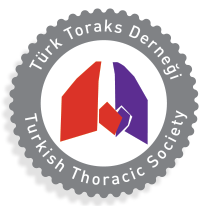Objectives: Brain metastases from non-small cell lung cancer develop in about one third of patients and have a poor prognosis. In patients with non-small cell lung cancer (NSCLC) with brain metastasis, mean survival with combined treatment methods is less than one year. There are not many studies on surgical resection results in patients with operated brain metastasis NSCLC. The aim of this study was to analyze the results of surgical treatment in patients with NSCLC with brain metastasis.
Methods: Twenty-five patients who underwent surgery for primary lung tumor and underwent gamaknife/craniotomy for brain metastasis were retrospectively analyzed.
Results: Twenty-one patients (21 male and 2 female) were included in the study. The mean age of the patients included in the study was; 61.7 (SD: 1.1, range: 52-76). Lobectomy was performed in 12 patients, wedge resection in 7 patients, pneumonectomy in 3 patients and bilobectomy in 1 patient. 11 patients underwent surgery for brain metastases, and 12 patients were given RT (gamaknife/cyberknife). Adenocarcinoma in 17 patients (73.9%), squamous cell carcinoma in 4 patients (17.4%) and large cell neuroendocrine tumor (8.7%) were seen in 2 patients. Five patients were still alive. Median survival was 25±4.8 months.
Conclusion: Consecutive treatments in patients with small cell lung cancer (NSCLC) with brain metastasis were found to benefit positively in patients’ survival.



.png)
